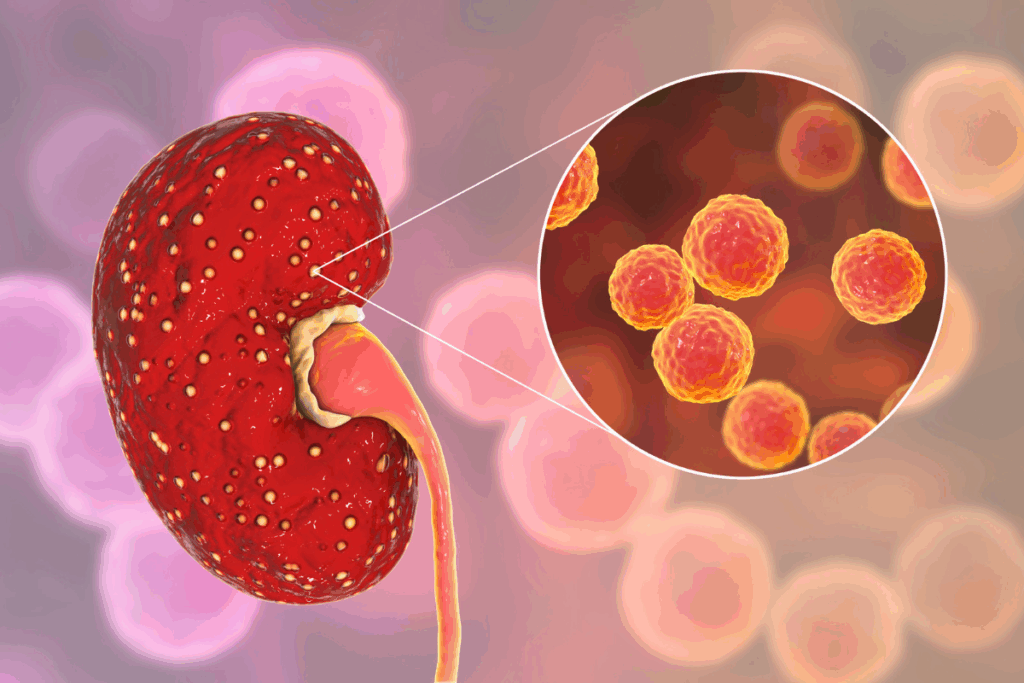As kidney disease progresses, patients often face unexpected digestive issues. These problems can greatly affect their quality of life. The link between failing kidneys and gastrointestinal symptoms is more common than many think.Does kidney diarrhea exist? Learn about how advanced kidney disease (CKD) can lead to chronic or acute gastrointestinal issues.

Nearly one in five patients starting dialysis treatment deal with diarrhea. This symptom can be hard to manage. At Liv Hospital, we understand the link between renal dysfunction and stomach problems. We aim to provide complete care for our patients.
Key Takeaways
- Kidney disease can lead to various gastrointestinal complications.
- Diarrhea is a common symptom in patients with end-stage renal disease.
- Understanding the connection between kidney disease and diarrhea is key for effective care.
- Gastrointestinal symptoms can greatly affect a patient’s quality of life.
- Comprehensive care for kidney patients includes managing stomach symptoms.
The Relationship Between Kidney Disease and Gastrointestinal Symptoms

People with kidney disease often face many gastrointestinal issues, like diarrhea. This is because kidney problems affect the body’s balance of fluids, electrolytes, and waste. When kidneys don’t work right, toxins build up, harming the digestive system.
Prevalence of Digestive Issues in Kidney Patients
Studies show that those with severe kidney disease often have stomach problems, like diarrhea. These issues include nausea, vomiting, and changes in bowel habits. Diarrhea is a big worry because it can cause dehydration, imbalances in electrolytes, and malnutrition, making health worse.
A study on gastrointestinal symptoms in chronic kidney disease found:
Symptom | Prevalence in CKD Patients |
Nausea | 40% |
Vomiting | 30% |
Diarrhea | 25% |
Abdominal Pain | 20% |
The table shows that many patients with chronic kidney disease have stomach problems. This highlights the need for care that covers both kidney and digestive health.
“The presence of gastrointestinal symptoms in patients with kidney disease is not merely a coincidence; it reflects the intimate relationship between kidney function and the digestive system.”
A leading nephrologist’s observation
How Kidney Function Affects the Digestive System
Kidney function greatly affects the digestive system. If kidneys don’t work well, waste products build up in the blood, causing uremia. Uremia leads to nausea, vomiting, and diarrhea. It also messes with electrolyte and fluid balances, affecting digestion.
It’s key to understand how kidney disease and stomach symptoms are linked. By treating both kidney disease and its digestive effects, doctors can help patients live better lives.
Understanding Kidney Disease: A Brief Overview
Kidney disease is a group of conditions that harm the kidneys’ function. This can lead to many health problems. The kidneys filter waste, control blood pressure, and balance electrolytes.
Types of Kidney Disease
There are many types of kidney disease, each with its own causes and symptoms. Chronic Kidney Disease (CKD) is a slow loss of kidney function. It’s often caused by diabetes, high blood pressure, and genetics.
Acute Kidney Injury (AKI) is a sudden loss of function. It can happen due to severe illness, certain medicines, or injury. Other types include Polycystic Kidney Disease (PKD) and Nephrotic Syndrome.
Common Symptoms of Kidney Disease
Symptoms of kidney disease vary by type and stage. Common signs are fatigue, swelling in the legs and feet, and changes in urination. Some people may also have abdominal pain.
As kidney disease gets worse, symptoms can get more severe. It’s important to know the signs of renal failure early. This can help slow the disease’s progress.
Kidney Diarrhea: Statistical Evidence and Research Findings
Diarrhea is common in people with kidney disease. We will look at how often it happens in different kidney disease stages. We will also talk about research on patients on hemodialysis.

Prevalence Rates in Different Stages of Kidney Disease
Studies show that those with End-Stage Renal Disease (ESRD) often have diarrhea. About 19 percent of new hemodialysis patients get diarrhea. The rates change with kidney disease stage, getting higher as it worsens.
Table: Prevalence of Diarrhea in Different Stages of Kidney Disease
Stage of Kidney Disease | Prevalence of Diarrhea |
Stage 3 | 10% |
Stage 4 | 15% |
ESRD | 19% |
Research on Hemodialysis Patients and Diarrhea
Hemodialysis patients face a lot of gastrointestinal problems, like diarrhea. Research shows diarrhea is a big issue for them. It affects their life quality and health.
Dealing with diarrhea in hemodialysis patients needs a full plan. This includes changing their diet and managing their meds. More research is needed to find the causes and better treatments.
Mechanisms Behind Kidney Disease-Related Diarrhea
Kidney disease and diarrhea are linked in many ways. Changes in how the intestines move, too much bacteria, and toxins build up. Knowing these reasons helps doctors treat stomach problems in kidney patients.
Abnormal Intestinal Motility Patterns
People with kidney failure often have weird gut movements. This can cause diarrhea. Studies show that toxins build up and mess with the gut’s nerves.
Uremic toxins mess with the gut, causing diarrhea. Doctors can use this knowledge to find better treatments for stomach issues.
Small Intestinal Bacterial Overgrowth
Diarrhea in kidney patients also comes from too much bacteria in the small intestine. This is called SIBO. It happens because the gut moves differently and because of certain medicines.
Diagnosing SIBO is hard, but it’s key to stop diarrhea. Doctors use antibiotics and diet changes to fight it.
Effects of Uremic Toxins on the GI Tract
When kidneys fail, toxins build up. These toxins can upset the stomach, causing inflammation and diarrhea. How the stomach reacts to these toxins varies, but it usually causes a lot of pain.
Understanding how uremic toxins affect the stomach helps manage symptoms. This knowledge helps doctors find ways to lower toxin levels and ease symptoms.
In summary, the reasons for diarrhea in kidney disease are complex. By tackling issues like gut motility, SIBO, and toxin effects, doctors can help patients better. This leads to more effective treatments for diarrhea in kidney patients.
Medication-Induced Diarrhea in Kidney Disease
Treatment for kidney disease can sometimes lead to diarrhea. This is because of the medications used. These drugs can upset the stomach and cause diarrhea.
Common Kidney Disease Medications That Cause Diarrhea
Many medications for kidney disease can lead to diarrhea. Here are a few examples:
- Antibiotics: These fight infections but can upset the gut, causing diarrhea.
- Immunosuppressants: These drugs weaken the immune system. They can also upset the stomach.
- Phosphate binders: These help control phosphate levels but can cause diarrhea.
Managing Medication Side Effects
Dealing with diarrhea from medications needs a few steps. Adjusting medication dosages or switching can help. Also, staying hydrated is key to avoid dehydration from diarrhea.
It’s important for patients to work with their doctors to manage side effects. This might include:
- Keeping an eye on any changes in symptoms.
- Changing diet to help with stomach issues.
- Trying probiotics or supplements to help the gut.
By managing medications and side effects, patients with kidney disease can reduce diarrhea. This improves their quality of life.
Kidney Disease and Abdominal Pain: The Connection
Kidney disease often shows up with stomach pain. We’ll look into why this happens and how to tell if the pain is from the kidneys or something else.
Why Abdominal Pain Occurs with Kidney Disease
Many people with kidney disease feel stomach pain. This pain can come from the disease itself, medicines, or other health issues.
Toxins building up can hurt the stomach. Also, medicines for kidney disease can cause stomach pain as a side effect.
Differentiating Kidney-Related Pain from Other Causes
Telling kidney pain from other stomach pain is hard. But, there are clues that can help figure out where the pain comes from.
Kidney pain usually feels like a dull ache in the back or side. It might spread to the stomach. If it’s a kidney stone, the pain can get sharp.
Cause of Abdominal Pain | Characteristics |
Kidney Disease | Dull ache in the flank or back, radiating to the abdomen |
Gastrointestinal Issues | Sharp pain, often related to eating or bowel movements |
Medication Side Effects | Varies, often accompanied by other gastrointestinal symptoms |
It’s important to understand how kidney disease and stomach pain are linked. Knowing the cause helps doctors treat the problem better. This makes patients feel better and live better lives.
Acute Kidney Injury and Diarrheal Illness: A Two-Way Relationship
The link between acute kidney injury and diarrheal illness is complex. It goes both ways. When kidney disease leads to acute kidney injury, it often comes with diarrheal illness. On the other hand, diarrheal illness can also cause acute kidney injury, mainly in those with chronic kidney disease.
How Diarrhea Can Trigger Acute Kidney Injury
Diarrhea can cause dehydration and upset the balance of electrolytes. This can harm the kidneys. For people with chronic kidney disease, their kidneys are already weak. So, diarrheal illness can easily push them over the edge into acute kidney injury.
Dehydration cuts down blood flow to the kidneys, making them work less well. Electrolyte imbalances, like too much potassium or too little sodium, can also hurt kidney function. This can lead to acute kidney injury.
“Diarrheal illness is a significant risk factor for acute kidney injury, specially in vulnerable groups like the elderly and those with pre-existing kidney disease.”
Increased Risk Factors in Chronic Kidney Disease Patients
People with chronic kidney disease face a higher risk of acute kidney injury from diarrheal illness. Their kidneys are already damaged, making them more vulnerable to further harm. Dehydration and electrolyte problems from diarrhea can push them over the edge.
- Pre-existing kidney damage
- Dehydration caused by diarrhea
- Electrolyte imbalances
Healthcare providers need to keep a close eye on patients with chronic kidney disease who have diarrheal illness. Quick action can stop acute kidney injury from happening.
Compromised Immunity and Increased Infection Risk
Kidney disease can weaken the immune system, making patients more vulnerable to infections. This is a big concern for those with kidney disease. It affects their health and makes them more likely to get gastrointestinal infections that cause diarrhea.
Impact on Immune Function
Kidney disease impacts immune function in several ways. The kidneys filter waste and toxins from the blood. When they don’t work right, toxins build up. This can weaken the immune system, making patients more likely to get infections.
Also, kidney disease often leads to chronic inflammation. This can weaken the immune system even more. We’ll look into this further, including how medications and other factors affect immunity.
Common Infections Causing Diarrhea
Patients with kidney disease are at higher risk for infections that cause diarrhea. Some common ones include:
- Clostridioides difficile (C. diff): A bacterium that can cause symptoms from diarrhea to life-threatening inflammation of the colon.
- Norovirus: A highly contagious virus that can cause severe diarrhea and vomiting.
- Salmonella: A type of bacteria that can cause gastrointestinal infection, leading to diarrhea.
Understanding how kidney disease affects the immune system and common infections is key. Recognizing these risks and taking precautions can help manage kidney patients’ health. This can reduce the complications from weakened immunity.
When to Seek Medical Help for Diarrhea with Kidney Disease
For people with kidney disease, diarrhea is more than a minor issue. It’s important to know when to seek medical help. Diarrhea can cause dehydration and upset the balance of electrolytes, which is risky for those with kidney disease.
Warning Signs That Require Immediate Attention
Certain symptoms need immediate medical care. Severe dehydration is a big concern, showing as excessive thirst, dark urine, and dizziness. Electrolyte imbalances can also happen, causing muscle weakness, heart problems, and more.
Other warning signs include:
- Bloody stools or black, tarry stools
- Severe abdominal pain
- Fever above 101.5°F (38.6°C)
- Signs of infection, such as chills or sweating
If you notice any of these signs, getting medical help right away is key.
Communicating Effectively with Healthcare Providers
Talking well with your healthcare provider is key when dealing with diarrhea and kidney disease. Be ready to share all about your symptoms, like:
Information to Share | Why It’s Important |
Duration and frequency of diarrhea | Helps figure out the cause and how serious it is |
Any medications you’re currently taking | Some meds can make diarrhea worse |
Dietary changes or new foods | Can help find what might be causing it |
By sharing all the details, you and your healthcare provider can create a good plan to treat it.
We know managing kidney disease is tough, and we’re here to help you through it.
Conclusion: Managing Digestive Health with Kidney Disease
Managing digestive health is key for those with kidney disease. We’ve looked at how kidney disease affects the gut, including causing diarrhea. Knowing this helps us give better care.
Patients with kidney disease can take steps to help their gut. Eating right, drinking enough water, and managing stress are important. A good diet and enough water help with gut issues and keep kidneys working well.
By focusing on digestive health, patients with kidney disease can live better lives. We urge patients to team up with their doctors. Together, they can create a plan to manage digestive health and lower the risk of kidney disease and diarrhea problems.
For more professional discussions, visit our Linkdin page.
FAQ
Can kidney disease cause diarrhea?
Yes, kidney disease can lead to diarrhea. This happens because of toxins and imbalances in electrolytes. It also affects the digestive system.
Is diarrhea a symptom of kidney failure?
Yes, diarrhea can be a sign of kidney failure. The kidneys struggle to remove waste and excess fluids. This can cause stomach problems.
Can kidney problems cause abdominal pain?
Yes, kidney disease can cause stomach pain. This pain can come from the disease itself, medications, or other health issues.
How does kidney disease affect the digestive system?
Kidney disease can upset the digestive system. It can lead to symptoms like diarrhea, stomach pain, and nausea.
Can medications for kidney disease cause diarrhea?
Yes, some kidney disease treatments can cause diarrhea. This includes antibiotics and immunosuppressants.
What are the warning signs that require immediate attention for diarrhea with kidney disease?
Look out for severe dehydration, imbalances in electrolytes, signs of infection, and persistent diarrhea. These are signs to seek help right away.
How can I manage diarrhea with kidney disease?
To manage diarrhea, eat well, stay hydrated, manage stress, and talk to your healthcare team. These steps can help.
Can acute kidney injury be triggered by diarrheal illness?
Yes, diarrhea can lead to acute kidney injury. This is due to dehydration, imbalances in electrolytes, and the effects of chronic kidney disease.
How does kidney disease affect immune function?
Kidney disease can weaken the immune system. This makes it harder to fight off infections that can cause diarrhea.
Are kidney patients at increased risk of infections that cause diarrhea?
Yes, kidney patients face a higher risk of infections. These infections can lead to diarrhea because of their weakened immune system.
Can kidney disease cause changes in urination?
Yes, kidney disease can change how you urinate. You might notice changes in frequency, consistency, or color.
What are the common symptoms of kidney disease?
Symptoms of kidney disease include feeling tired, swelling, changes in urination, and stomach problems like diarrhea and pain.


































